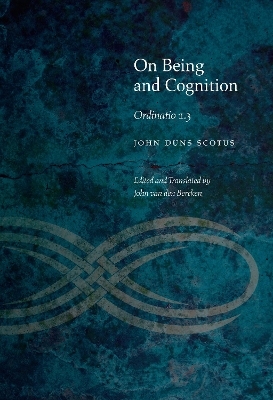
On Being and Cognition
Fordham University Press (Verlag)
978-0-8232-7073-6 (ISBN)
- Lieferbar (Termin unbekannt)
- Versandkostenfrei
- Auch auf Rechnung
- Artikel merken
In On Being and Cognition, the first complete translation into English of a pivotal text in the history of philosophy and theology, Scotus addresses fundamental issues concerning the limits of human knowledge and the nature of cognition by developing his doctrine of the univocity of being, refuting skepticism and analyzing the way the intellect and the object cooperate in generating actual knowledge in the case of abstractive cognition. Throughout the work Scotus is in discussion with important theologians of his time, such as Thomas Aquinas, Henry of Ghent, and Godfrey of Fontaines. Anyone interested in the pertinent philosophical problems will find in this book the highly sophisticated and subtle answers of a giant in the history of thought.
John Duns Scotus (Author) John Duns Scotus was one of the most important philosophers and theologians of the Middle Ages. John van den Bercken (Edited & Translated By) Dr. John van den Bercken specializes in philosophy, psychology, and cognition.
Abbreviations Outline of Ordinatio 1.3 Introduction Univocity of being and natural knowledge of God The first object of the intellect The adequate object of the intellect Knowledge and certainty Intellective memory and intelligible species The causes of intellection Trinity in man: trace and image Ordinatio 1.3 Part 1: On the possibility of having knowledge of God by natural means Question 1: Can God be known naturally by the intellect of the wayfarer? Question 2: Is God the first thing naturally known by us in our present state? Question 3: Is God the first natural and adequate object for the human intellect in its present state? Question 4: Can the intellect of the wayfarer know any certain and genuine truth by natural means without any special illumination by the uncreated light? Ordinatio 1.3 Part 2: On the trace of the Trinity Single Question: Is there in every creature a trace of the Trinity? Ordinatio 1.3 Part 3: On the Image of the Trinity Question 1: Does the intellective part of the soul contain memory as having an intelligible species naturally preceding the act of thinking? Question 2: Is the intellective part of the soul, taken properly, or a component of it, the total cause generating actual knowledge or the reason for generating it? Question 3: Is the object, as present in itself or in its species, or the intellective part of the soul the main cause of the production of knowledge? Question 4: Is there an image of the Trinity in our mind? Notes to the translation Further reading References
| Erscheinungsdatum | 24.05.2016 |
|---|---|
| Reihe/Serie | Medieval Philosophy: Texts and Studies |
| Übersetzer | John van den Bercken |
| Verlagsort | New York |
| Sprache | englisch |
| Maße | 152 x 229 mm |
| Themenwelt | Geschichte ► Allgemeine Geschichte ► Mittelalter |
| Geisteswissenschaften ► Philosophie | |
| Geisteswissenschaften ► Religion / Theologie | |
| ISBN-10 | 0-8232-7073-4 / 0823270734 |
| ISBN-13 | 978-0-8232-7073-6 / 9780823270736 |
| Zustand | Neuware |
| Haben Sie eine Frage zum Produkt? |
aus dem Bereich


